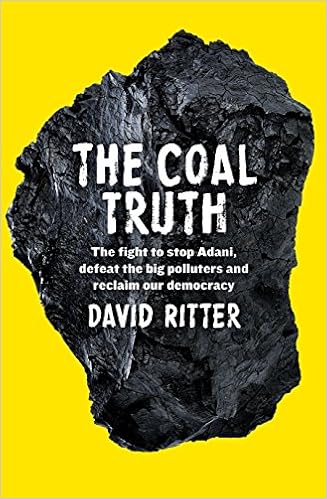The Coal Truth brings into sharp focus why the proposal to mine coal in the Galilee Basin in Central Queensland is so critical to our common future.
The unassuming word Adani has come to represent an immense conflict over how Australia’s, and the world’s, future is imagined. On one side we have a fossil-fuels-forever Australia, basically doing business as usual, and on the other side we have an Australia sustainably transformed. At present, given that in recent years Australia’s carbon emissions have been rising again (!), fossil-fuels-forever appears to be winning. The stakes surrounding Adani’s coal-mining project are therefore incredibly high. David Ritter’s The Coal Truth powerfully outlines why Adani must be stopped and how this effort plays a fundamental role in coming to terms with a more sustainable Australia – and planet.
Although I vaguely understood what Adani represented, this book brings into sharp focus, in both a political and environmental sense, why the proposal to mine coal in the Galilee Basin in Central Queensland is so critical to our common future. If the mines do proceed:
… they could produce up to 330 million tonnes per year of coal for export, releasing an estimated 705 million tonnes of carbon dioxide per year (more than Australia’s total annual domestic greenhouse gas emissions) that would contribute to a catastrophic global warming trajectory of up to 6 degrees Celsius.
The book is divided into two sections. The first is written exclusively by David Ritter, CEO of Greenpeace Australia Pacific, and traces his engagement with Australian climate-change politics and his efforts to stop the opening up of the Galilee Basin to coal mining. Too often the intersection of climate change, politics and mining are presented in very abstract and dispassionate ways. One of the great strengths of this book is Ritter’s engagement with these seemingly abstract topics through his very personal, and sometimes humorous, experiences with climate change and the fight to stop Adani. For example, Chapter 7 begins:
‘Dad, where do coal mines come from?’ My daughter J.’s question takes me by surprise. ‘Well,’ I’m tempted to respond, ‘when a government and a mining company love each other very much …’ But, actually, the child’s curiosity gives me pause to reflect. Australia’s landscape has been so altered by the activity that one could be forgiven for thinking that mining occurs naturally, rather than being something that we, the people of Australia, decide should be allowed at each given time and place.
Part two of the book brings together environmentalists and academics like Will Steffen and John Quiggin to outline in very digestible terms the ramifications of coal mining in the Galilee Basin. There are three points of analysis within this section of the book that powerfully illustrate the absurdity of Adani. First, John Quiggin outlines that even with the proposed state and federal government subsidies, the Adani project makes little economic sense. Second, Hilary Bambrick, a public health academic, forcefully rebukes the likes of former Prime Minister Tony Abbott – who infamously described coal as ‘good for humanity’ – by underscoring the high human cost of coal:
It’s not only adults who are being killed by coal; in India, around 10,000 children aged under five die from coal pollution each year. Ten. Thousand. Children.
Third, Rachira Talukdar, an environmental campaigner in Australia and India, outlines the ecologically destructive practices of the Adani Corporation in India and why the proposed Adani project is not a good news story for India’s poor.
There is much to this book. The personal narrative of David Ritter, combined with the more focused analysis from other contributors, provides a rich and at times confronting account of Adani and why it must be stopped.

No comments:
Post a Comment